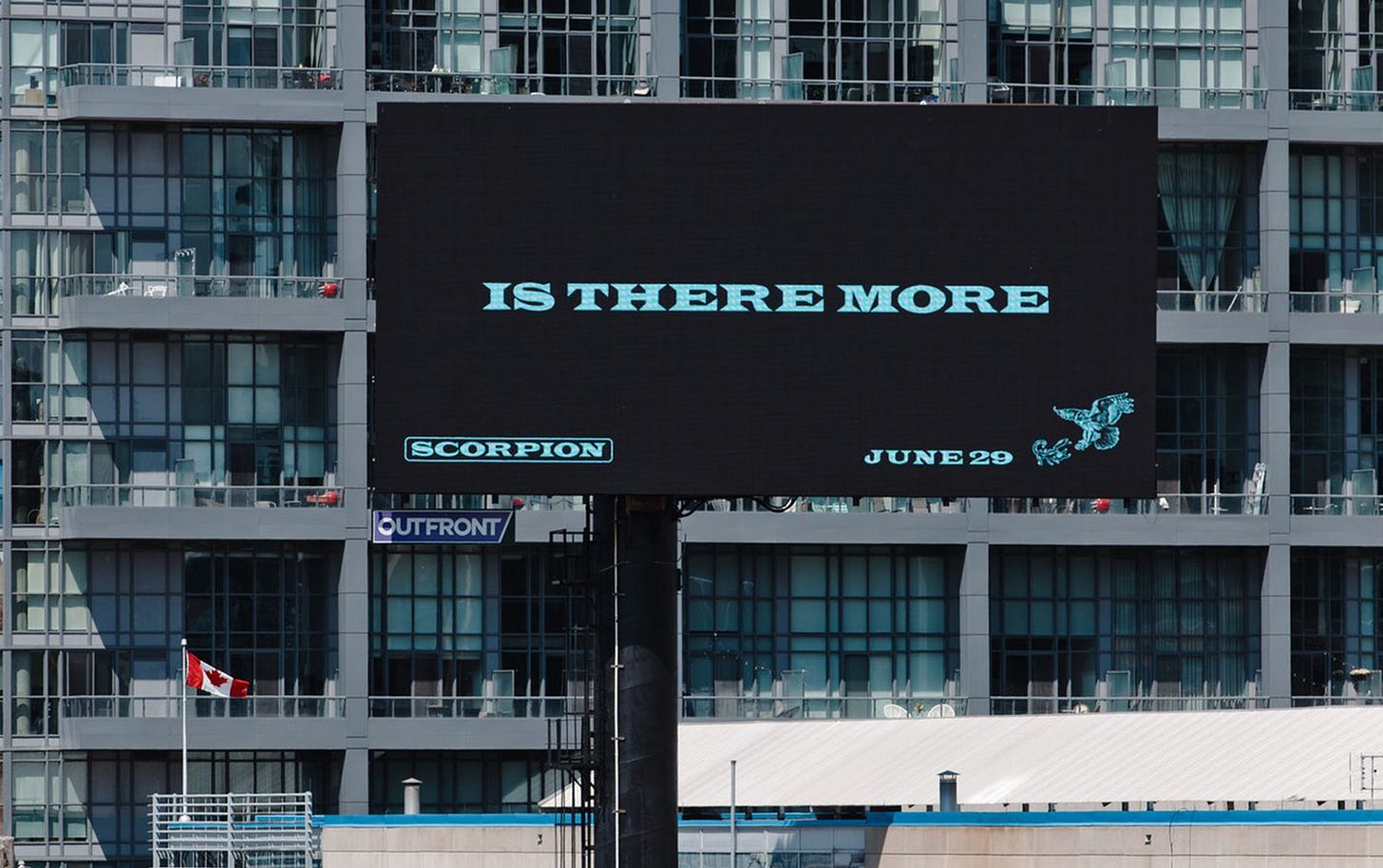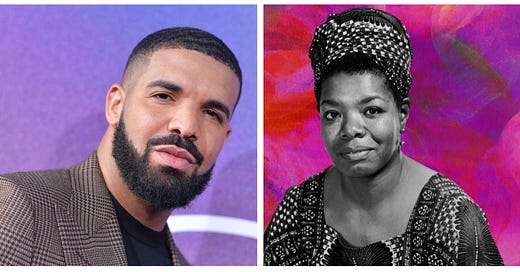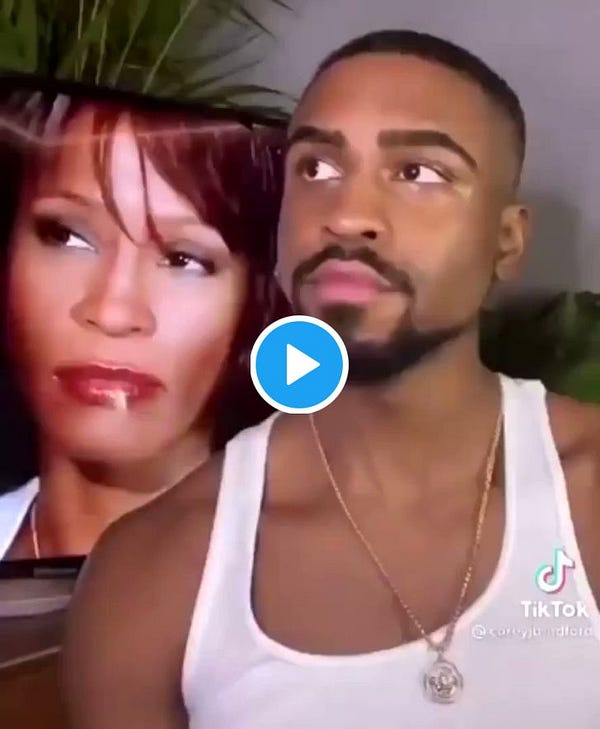"Is There More?" Drake Name-Drops Maya Angelou and Asks a Critical Question
On Haters, Hate, and Wanting More
PopPoetry is a poetry and pop culture Substack written by Caitlin Cowan. You can learn more about it here. Check out the archive to see other tv shows, movies, and films whose intersections with poetry I’ve covered. If you like what you read and want it in your inbox, subscribe so you won’t miss a post!
Let’s talk about six words in a Drake song.
The opening lines of “Is There More,” from the 6 God’s 2018 double album, Scorpion, go like this:
Only holdin’ up I do is my end of the bargain
Only beggin’ that I do is me beggin’ your pardon
Only tryin’ that I do is me tryin’ the hardest
Only problems I do are math problems with profit
Only lyin’ I do is lyin’ out in the tropics
Only cryin’ I do is cryin’ from laughin’ ‘bout it
Only lackin’ I can do is my lack of responses
Only rest that I do is, “Where the rest of my commas?”
Still I rise, Maya Angelou vibes
When life comin’ at you from all angles and sides
Those bolded words have stuck in my mind since the very first time I listened to the album. It’s a poetry reference—and a damn good one. It’s also a name-drop of epic proportions that conjures a whole spectrum of the Black experience and the struggle for equality, and it’s nestled into a song and an album that, to a large extent, is about existential questioning.
Sure, that existential questioning might feel a bit like “circling around and around on a cul-de-sac in a luxurious gated community,” as one critic described it. It’s true that Drake does more ruminating on the past and present than forward-thinking and boundary-breaking on this album. But part of that rumination includes a nod to a pioneer of poetry and political activism: a worthy subject for reconsideration if there ever was one.
Drake’s sixth full-length album, Certified Lover Boy, was scheduled to drop in January 2021. Due out any day now, let’s revisit his most recent album and one of its fascinating referential moments while we wait.
The Sting of Scorpion
Critics have described Drake’s fifth full-length album as too long, too dull, too safe, too “Drake doing things because he can, rather than because he should.”
Scorpion contains bouncy, buoyant hits like “God’s Plan,” “In My Feelings,” and “Nice for What,” but its behemoth 25-song tracklist contains quieter moments, too, and plenty of them. Some have disparaged the weedy, moody bottom of the album in particular, and Jamieson Cox smartly notes that “Splitting Scorpion into two distinct sides—rap and R&B—detracts from his pioneering synthesis of those two genres.”
But as a fellow Scorpion, I vibe with even the most dirge-like, self-indulgent tracks on the album’s back half. “Is There More” is the A-side closer, which leads into this woozier, R&B-heavy side, and in some ways, it reads like a summation of the album’s major themes.
Craig Jenkins’s excellent, detailed, and nuanced review is the best I’ve read, and in the run-up to this writing, I read a lot. Of reviews. Of Scorpion. Jenkins touches on the easy criticisms of the album but is ultimately much fairer to Drake overall. Rather than wasting column inches on how long and fractured and boring the album is, Jenkins takes for granted that Scorpion exists in its current form and digs deeper into the substance of the tracks and finds much to admire even as he ultimately arrives at the conclusion that Drake isn’t growing as an artist on this effort. He’s similarly gripped by the many small questions and the single big question that “Is There More” asks:
Is Drake turning into one of those 30-somethings who dates people seven to ten years their junior but can’t grasp that they want different things out of life? Is he stagnating, or is Drake’s idea of who needs a Drake, of what a Drake should be versus what he could be, too set in stone? Is there more?
Rolling Stone has referred to Drake as “the poet laureate of Instagram captions,” and much has been made of the rapper’s sensitivity or performance of sensitivity over the years (I mean… he’s been shaving a heart into his hair in the run-up to CLB). It makes sense that poetry would pop up as a subject for this artist, and “Is There More” is a particularly poignant opportunity for Drake to engage one of his poetic ancestors.
Maya Angelou’s “Still I Rise”
“Still I Rise” is the title-ish poem of Maya Angelou’s 1978 collection, And Still I Rise. Published deep into her career after she had already achieved widespread fame and recognition for I Know Why the Caged Bird Sings, Angelou’s third book of poetry is one of her most enduring.
Angelou’s accomplishments are astonishing: in addition to her work as a memoirist and poet, she’s been involved in the worlds of dance, education, documentary, playwriting, and more. She raised a child, survived sexual violence, married and had love affairs, was awarded countless honorary degrees, and became Oprah’s mentor. If Maya Angelou were to ask “Is There More,” the answer would be, undoubtedly, “How could there possibly be more?”
Known as a “public poet,” Maya Angelou has been studied and lauded more as a memoirist. Her poetry is understudied and deserving of richer attention. I am skeptical, as you may know, of the ways in which we talk about poets and poetry, and when someone is dismissed as a poet of the people, my ears perk up. What I hear in the term public poet is the secret idea that poetry is not supposed to be for the public, or that real poetry is for an elite set, or that writing poetry for the people is an activity that renders one less-than as an artist.
Different poets certainly have different audiences, which is all well and good. But sometimes beneath the thin layer of deference inherent to the term “public poetry,” there exists an even thicker layer of racism. I see this in discussions of slam poetry all the way up to discussions about Amanda Gorman’s inaugural poem for President Biden. (The only other Black woman in history to write an inaugural poem? Why that would be Angelou herself: “On the Pulse of Morning” was delivered during Bill Clinton’s 1993 inauguration.) Sometimes critiques about the content or tone of poetry are really just veiled admissions that the folks doing the critiquing (e.g., white folks) don’t think that the poet “belongs” in the world of poetry. And that shit has to stop.
Angelou’s poem has as much swagger and self-import as any rap song ever written. It also has as much music, anaphora, and wit as any poem in your dusty textbook of choice. It’s also funny, sexy, and powerful. It is clear in its message and meaning, and that is a tremendous asset, from where I’m standing.
You may shoot me with your words,
You may cut me with your eyes,
You may kill me with your hatefulness,
But still, like air, I’ll rise.Does my sexiness upset you?
Does it come as a surprise
That I dance like I’ve got diamonds
At the meeting of my thighs?Out of the huts of history’s shame
I rise
Up from a past that’s rooted in pain
I rise
I’m a black ocean, leaping and wide,
Welling and swelling I bear in the tide.
The idea that poetry has to be difficult to understand in order to be “good” is just one hideous manifestation of literary gatekeeping and a pernicious cultural resistance to Black artists even as we co-opt Black culture and Black vernaculars in arenas like slam and spoken word.
But you know what? Through all of it, she will rise.
The poem that Drake name-checks in “Is There More” is a celebration of Blackness and Black womanhood. But a Black woman making the kind of declarations that Angelou first did in 1978 had a different valence than Drake’s boastful bragging in 2018.
The Aforementioned “Vibes”
What does it mean for Drake to invoke Angelou’s poem? What are Maya Angelou vibes?
One thing that has always fascinated me about rap is the ease with which listeners locate the singer as the “I” in the lyrics. Compared to our torturous perennial discussions of whether or not the “speaker” of a poem is the poet themselves (the “speaker of my poems” genre is particularly rich on Twitter) or some fractionally accurate portrayal of the poet, rappers seem to assert their selfhood with less handwringing than poets do.
While no one demands the capital-T Truth from rappers, we regularly assume that the “I” of rap songs, perhaps even more so than songs from other musical genres, is the artist themselves. Part of this has to do with the idea of credibility and respect, which are qualities derived from being “real” rather than adopting a persona.
So when Drake raps “Still I rise, Maya Angelou vibes,” we locate that “I” as Aubrey Drake Graham.
And what does “Still I rise” mean to Aubrey? It means fuck the haters: one of rap’s most prevalent themes, particularly among hugely successful rappers like Drake. They hate me because I’m successful: that message is delivered again and again in so many of Drake’s albums, and Scorpion is no different in that respect.
Essentially, the Angelou reference in Drake’s song means “Nothing can stop me. No matter what you throw at me, I will still rise up.” But the adversary of Angelou’s poem isn’t mere haters—it’s hate itself. The hate she’s talking about isn’t correlated to her success: it’s correlated to the color of her skin.
In the 40-odd years since Angelou’s poem was published, some things have changed while others have stayed the same in the landscape of American race relations (and far too much of the latter than the former).
The adversary of Angelou’s poem isn’t mere haters—it’s hate itself.
Drake’s raps exist in a world where the products of Black culture are valorized but Black citizens are killed by the police at three times the rate of white citizens. Rap is still routinely described as too violent, too vulgar, or devoid of artistry but dominates the music industry and informs much of our wider culture. Black fashion and hairstyles are deemed “unprofessional” but are appropriated with glee by white folks. Black athletes adorn posters but are essentially shitcanned when they peacefully protest the systemic racism that pervades their everyday lives.
But Angelou, who was born into a segregated Arkansas, speaks even more directly of the struggle to have her humanity recognized as a Black woman. “I am the dream and the hope of the slave,” she writes near the end of “And Still I Rise.” And though Drake’s personal struggles are certainly hued by his experience as a man of color, Drake’s reference to Angelou is a tacit acknowledgment that things have changed but have also stayed the same.
Fans often say that they wish Drake would write more openly about Black Lives Matter, police brutality, and more—an old open letter from 2016 is his most robust statement on the issue to date.
But with this brief reference and other quiet moments in his work, Drake does acknowledge the struggle for Black equality in his own ways, and he’s asking big questions even if he’s not ready for the answers—even if we’re not ready for the answers.
The Secret of “Is There More” is “There Is More”
As a poet, writer, and general word nerd, it’s not lost on me that the title of “Is There More” is a question that lacks a question mark. Technically, that makes it a statement.
Drake knows that there’s more, and his litany of questions all have the same answer:
Yes.
Yes, there’s more to life than money, beautiful women, fame, and “trips to Dubai.” There’s more to life than having all 25 tracks of your insane double album enter the Billboard Hot 100 simultaneously while shattering Spotify’s one-day global record for album streams (that’s 132.45 million in a single day, if you’re keeping score).
There is, for example, love. Love. Community. Fatherhood. And Drake raps about all of these on Scorpion, too, along with the drama of commas and comments sections. But they’re all just as complicated and by turns fulfilling and unfulfilling as “digits and bankin’ accounts.”
Our Certified Lover Boy keeps getting his heart broken but keeps anteing up again, though on “Fair Trade,” a leaked track from his upcoming album, Drake says “I gotta be single for a while / you can’t control me.” (We’ll see how long that lasts.) He even tries to connect more directly to the idea of community by handing out wads of real cash to real folks on the street in the video for “God’s Plan.” As for fatherhood, the revelation that Drake has a son all but swallowed the release of the album itself.
In short, Drake knows there’s more, but it felt like he wasn’t quite ready for the next level in 2018. Maybe that’s changed now; maybe it hasn’t.
There’s also a kind of sad poeticism about all of this in light of the Angelou poem he references on “Is There More.” That a young man who looks like Drake can have these sorts of existential problems—How do I feel about fatherhood? Does money make me happy? What’s next now that I’ve achieved so much?—are both perennial and remarkable. We still have so, so far to go when it comes to the critical fight for racial justice, and only a small percentage of Black folks get to have the luxurious concerns that Drake does. There is more, certainly, when it comes to equality. There are more gains to be made: many, many more.
But both Drake and Angelou share a resolute spirit that is unstoppable, unquenchable, and unkillable. Though Drake is undoubtedly standing on the shoulders of giants like Angelou, by locating his own personal struggles within the larger framework of the struggle for Black equality, he ties his private battles to the larger battles that people of color face at every turn in a way that feels genuine even when the reference itself functions as a kind of acknowledgment that things haven’t changed.
And it only took six words.

P. S.
A new indie short film called The Poet and the Plant is “a meditation on true love, loneliness, and listening.” You can stream it here.
British poet Ruth Padel attempts to provide a fuller picture of Beethoven’s life in a collection of poems that function as a kind of biography of the great composer.
Poetry and pop culture supercollider: Kelly Marie Tran surprises the young poets of the upcoming film Summertime on a Zoom call, and one of them brings her to tears with a poem they wrote about Tran’s Star Wars character, Rose Tico.
As always, if you know someone who might enjoy this post, consider sharing it or subscribing yourself. I appreciate your support!






